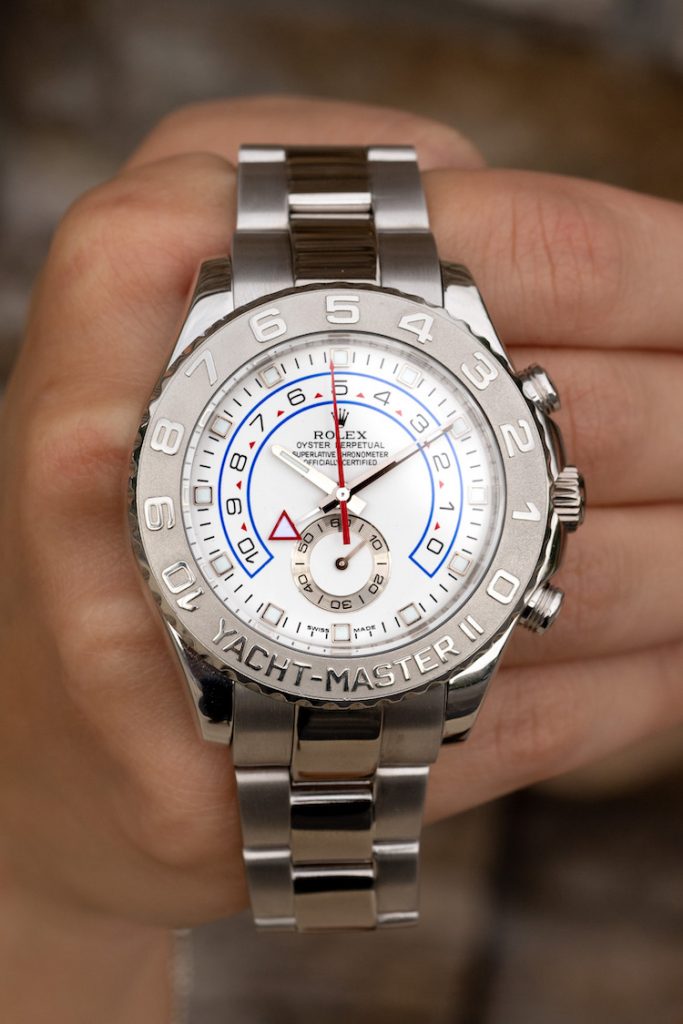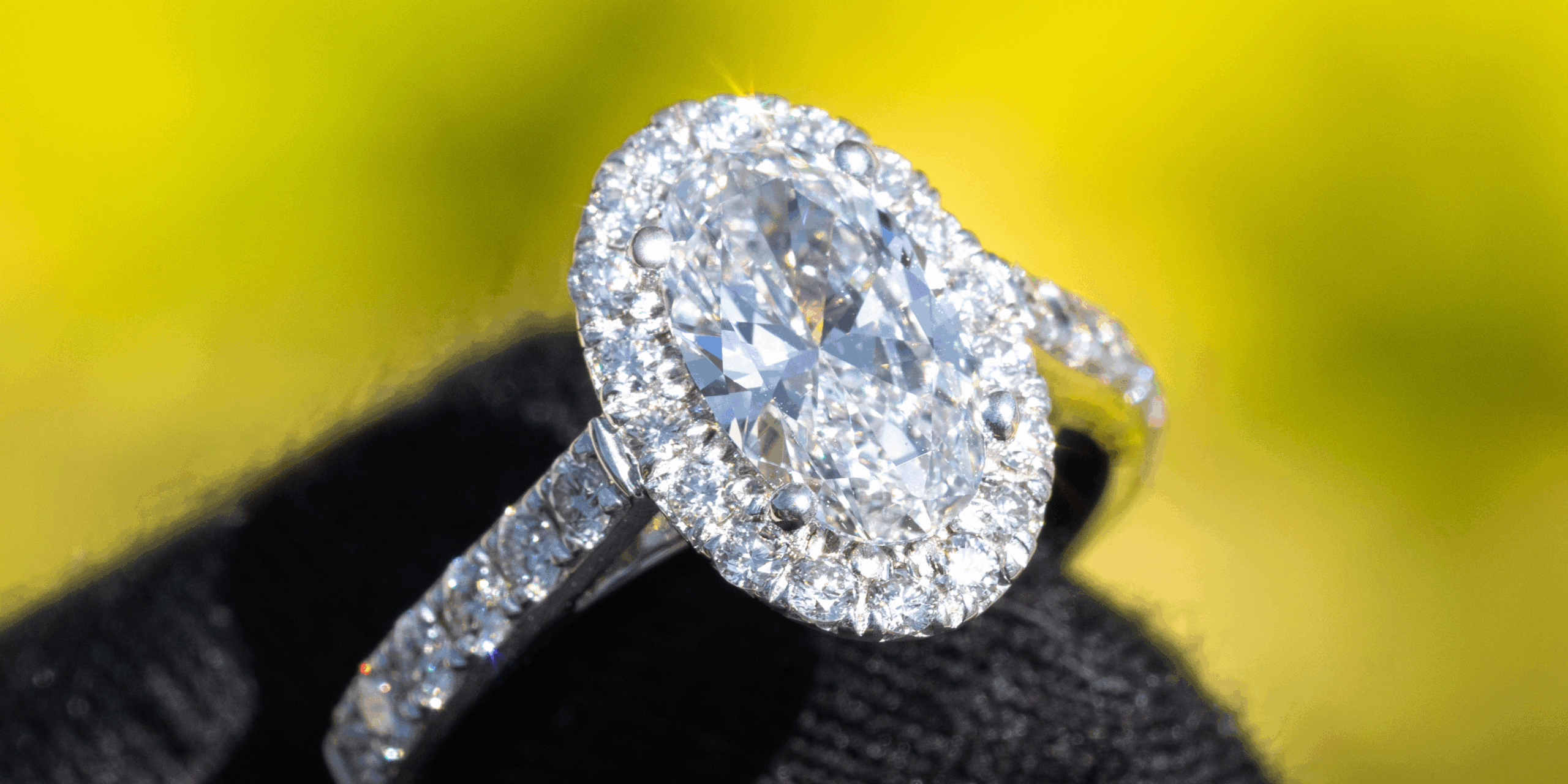The Rare and Collectible White Gold & Platinum Rolex Yacht Master II
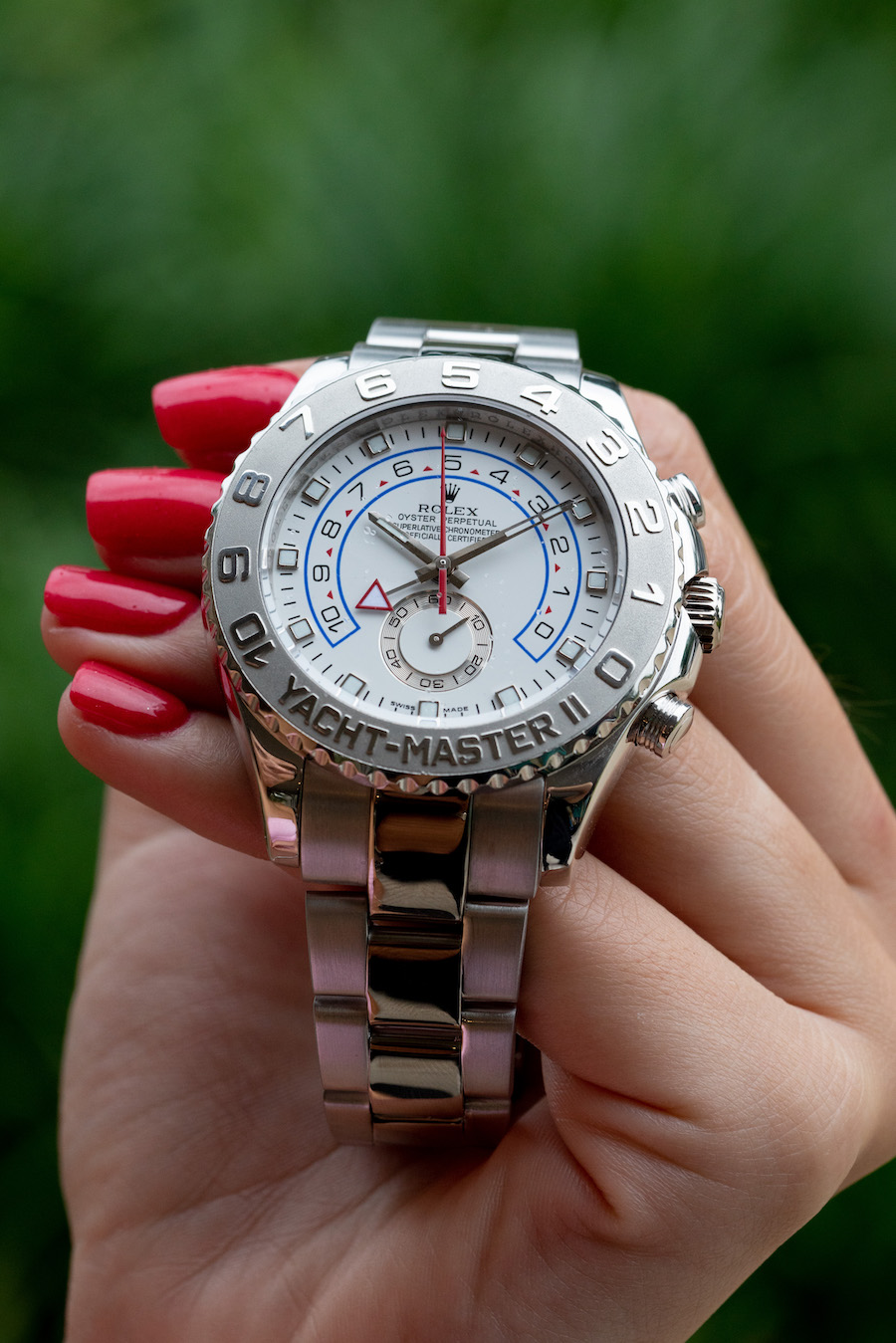
Among the Rolex catalog, the Yacht Master II collection is a standout, and among the Yacht Master II’s, the white gold and platinum combination, reference 116689, is quite possibly the most remarkable. One thing is for sure, the Yacht Master II ref 116689 is the rarest version, and because of its scarcity and immense desirability, it is arguably the one with the most potential to be a future collectible.
HISTORY OF THE YACHT MASTER II
The Yacht Master II is a collection based on the successful Yacht Master. It was first introduced to the world in 2007, 15 years after the original Yacht Master debuted, but the collection wasn’t put on the market until 2010. When they finally did, the Yacht Master II instantly became a huge success.
Like all Rolex sports watches, the Yacht Master II was designed for a specific profession, sailing…and more specifically, regatta racing. This is an honest professional yachting watch, with its flyback chronograph and programmable countdown timer.
Upon its official release, Rolex gave the world the yellow gold Yacht Master II reference 116688 and the white gold and platinum Yacht Master II reference 116689. One year later, Rolex introduced a two tone steel and Everose gold version.
The price point for the precious Yacht Master II’s put them among Rolex’s most expensive sports watches.
In 2013, the entry point into the Yacht Master II club dropped with the release of the fully stainless steel Yacht Master II. This made the collection more accessible, at least to those who could get their hands on one brand new. The steel version was and still is hard to get new at an authorized dealer, and it often sells for a premium on the secondary market.
It was also during this time that all of the Yacht Master II’s got an engine upgrade. The watch remained the same, but the movement changed. They received the more advanced calibre 4161 that we still get with new Yacht Master II’s today.
The most recent update to the Yacht Master II collection came in 2017. The updates were not exactly significant, mainly dial aesthetics, which included larger hands, a Mercedes style hour hand, a skeletonize minute hand, and an inverted triangle at the 12 o’clock and a rectangular hour marker at the 6 o’clock.
As you can see, the white gold Yacht Master II 116689 that we are selling at Diamonds By Raymond Lee is a pre-2017 model.
No changes to reference numbers
Interestingly, Rolex decided not to change the reference numbers with the updates in 2013 and 2017. The Yacht Master II’s all have the same reference numbers as when they were first released. So, the only way you can tell what version a Yacht Master II is by looking at the paperwork or the dial aesthetics for post 2017 models.
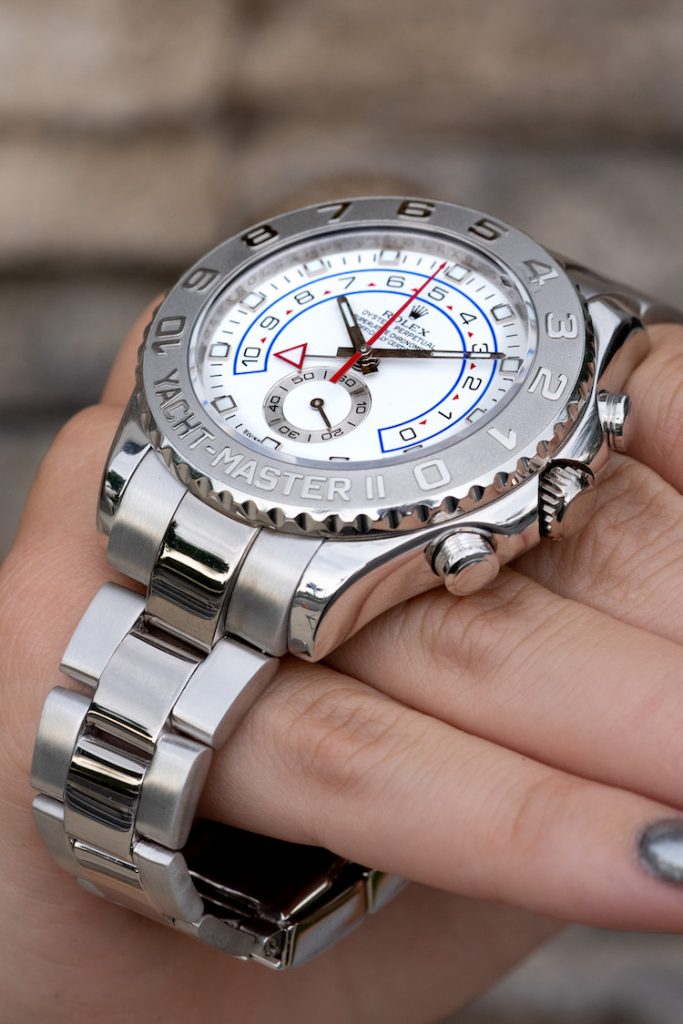
ONE OF ROLEX’S MOST COMPLICATED WATCHES
Before the Yacht Master II collection, Rolex’s emphasis on complications were pretty vapid. You had the chronograph on the Daytona, the second timezone on the GMT, and a day and date complication on the Day-Date. Nothing too fancy. With the Yacht Master II’s programmable flyback regatta chronograph, that all changed. When the Yacht Master II was unveiled in 2007, it instantly became Rolex’s most complicated watch.
It is possibly the most useful chronograph Rolex has ever created. It’s not just for boat racing! It has a 10 minute countdown to zero, it counts down backwards. This can be used for any purpose.
What’s more, we find that timing intervals of 10 minutes or less on a very legible chronograph is far more useful than the almost indecipherable and hard to read subdials on a Daytona. This is just very clean and easy to use.
Note: Rolex’s newest collection, the Sky-Dweller, is now Rolex’s most complicated watch, putting the Yacht Master II collection in second place. Nevertheless, the Yacht Master II is a highly complex watch (yet easy to use), so let’s discuss its functionality in more depth.
REGATTA TIMER COMPLICATION
First, let’s explain the point of a regatta chronograph. Its purpose is to track both racing time and the count down of the very important minutes that occur before the racers cross the starting line.
The former point is critical as yachts obviously can’t do a standing start like a race car.
The Fleet Race takes place on a course marked by buoys and it starts with a five, seven or ten minute countdown at which time the yachts begin sailing the course. The countdown is decided by race officials prior to the start of the race.
Regatta racers need to strategically order themselves on the starting line, taking in factors like wind and other competitors. The goal is to cross the line as close as they can to the starting signal, but never before as that will cause penalty points.
The skipper of the yacht is in charge of this timing. So, the skipper is the one who needs a watch like the Yacht Master II.
All in all, it is a very prestigious kind of race, worthy of a watch like the Rolex Yacht Master II.
How does the Yacht Master II Regatta Countdown work?
We should first note that the subdial above the 6 o’clock is the running seconds. It has nothing to do with the regatta chronograph. The long red hand is part of the chronograph.
Regatta Timer & Ring Command Bezel
The bezel is not just beautiful, it is part of what controls the programming of the regatta timer.
As you can see on the dial within the blue section, there is 10-0. That is the countdown. 10 minutes to zero minutes (it counts down).
You can set the regatta timer to any number 0-10 (no half-numbers). The large red arrow indicates the countdown time.
To program the timer, rotate the bezel from its standard position (the one you see in the featured pics), counter-clockwise, to position two. You will hear it click.
Then, push the bottom pusher in. It will lock in place. After that, you can unscrew the watertight crown counter-clockwise, and once it is unscrewed, you rotate it clockwise to move the short red arrow. You will see it jump from 0 to 1 to 2 with each turn.
Once you set the minute you want to countdown from, you rotate the bezel back to position one (you will hear the bottom pusher pop back out). Remember to screw in your crown.
When you are ready to start the timer, you push the top pusher. The large red second hand will start to rotate. As the long red seconds hand rotates (60 seconds is a full rotation), the short red and white arrow will move as well.
If you want to stop and start at any point, you simply press the top pusher. You can also reset it back to the original programming by pressing the bottom pusher. You will see both arrows flyback to their starting position.
From there, if you want to set the watch to a different time or back to 0, you use the same process of rotating the bezel to position two and so on.
Now, let’s talk more about the aesthetics and wearability.
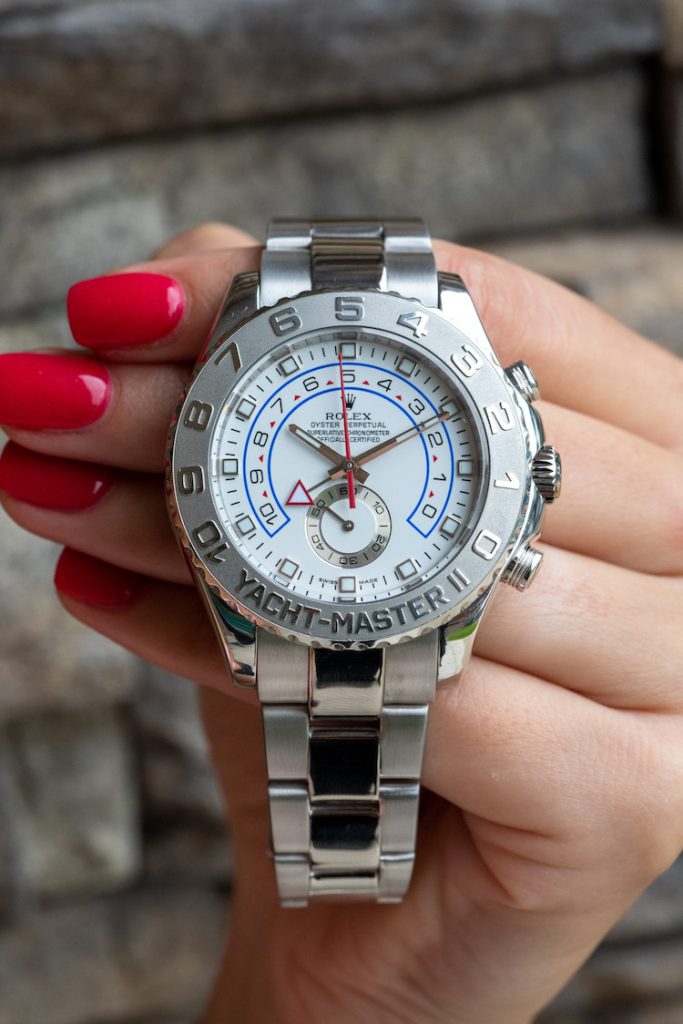
YACHT MASTER II 116689
It’s not so uncommon to see a steel, yellow gold, or two-tone Yacht Master II, but the white gold and platinum version is a model that you will not see on the streets very often. In fact, it is quite a rare site to see. This is probably because it costs a lot more than the other Yacht Master II models and Rolex produces less of them.
The white gold and platinum combination doesn’t just change the cost of the Yacht Master II, but it also dramatically alters its appearance. This is because all of the other versions have colored bezels with ceramic inserts. The white gold Yacht Master II’s bezel is entirely made from the noble metal, platinum.
While Rolex’s ceramic bezels are extremely durable, they aren’t really worth anything. There’s no intrinsic value to them. Platinum, on the other hand, is the most valuable metal of them all and the ultimate symbol of prestige.
18K WHITE GOLD
Besides the platinum bezel and the white dial, the watch is entirely white gold. The case, caseback, bracelet and clasp are finely crafted from 18k white gold. And not just any white gold, this is Rolex’s very own white gold.
Rolex’s white gold is made from the purest metals and it is scrupulously inspected at their in-house lab using state-of-the-art equipment before it is structured, shaped, and finished with the same meticulous care into the watch you see here.
It should also be noted that Rolex’s white gold is not plated with rhodium like many white gold jewelry, so it will not tarnish or need to be re-plated.
CASE, BRACELET & DIAL
The case is a standard Rolex Oyster case, yet much larger at 44mm in diameter. With the Tripock crown, it has 100 meters (or 330 feet) of water resistance.
The bracelet integrates seamlessly with the case. It is the iconic, sporty and durable Oyster bracelet. It features an Oysterlock clasp as well, which has 5mm of easy extension built in.
As for the dial, it’s a pearly white backdrop with platinum hands and hour markers, as well as a platinum sub-chapter ring. The hour markers and hands have lume so the watch is easily legible at night. Inside the blue lines, you have the regatta countdown timer, which we’ve already discussed, as well as the red arrow, red regatta chrono seconds hand and running seconds sub-dial. All in all, the dial is so perfectly laid out and the colors make separating the main time from the regatta chronograph effortless.
ON THE WRIST
With the white gold case, the platinum bezel and the white dial, the impression of the Yacht Master II 116689 on the wrist is even bigger than the already sizable 44mm case that it is.
While the colored bezel Yacht Master II’s look on par with a Royal Oak Offshore in terms of wrist presence, the white gold and platinum model appears almost similar to Hublot King Power in that regard, and that’s a 48mm watch.
Now, when talking about wrist presence, we don’t exactly mean size, as this watch doesn’t span the wrist in the same manner as the aforementioned watches. It just has that same commanding noticeability.
The Yacht Master II is undoubtedly a large watch, at 44mm in size. However, it has a nice compact lug to lug measurement of 53mm, which means it spans the wrist like that of a 42mm Royal Oak Offshore.
What’s more, this watch is heavy. It feels like a million bucks on the wrist.
All in all, this means you get that powerful wrist prescience and feel but you don’t need such a huge wrist to pull it off, like you would if you want to wear a King Power or even a Hublot Big Bang or a 44mm Royal Oak.
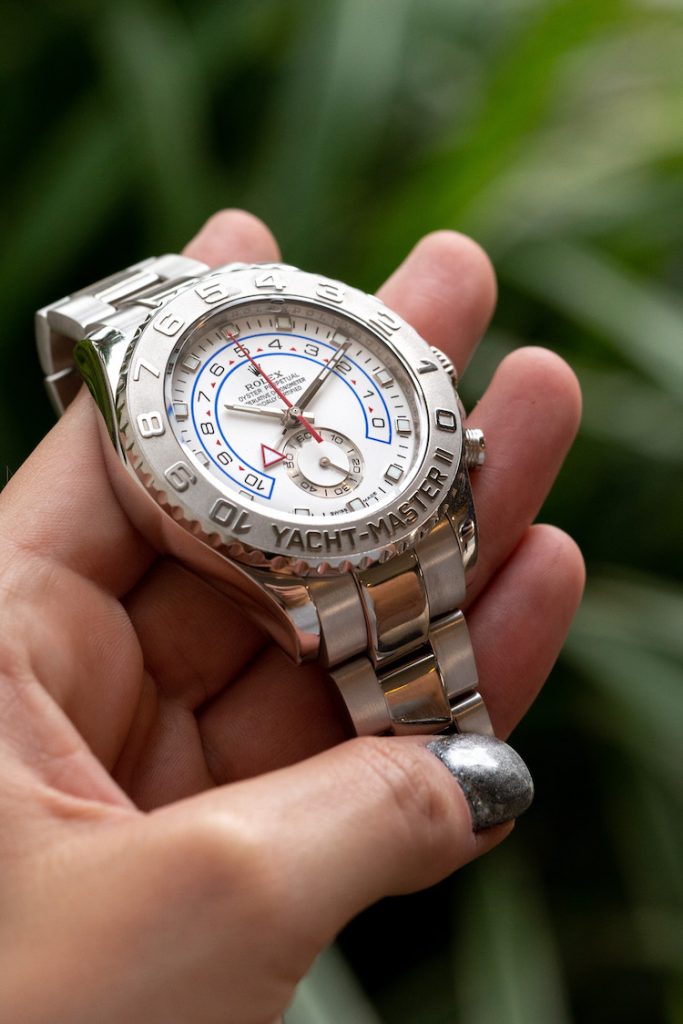
RARITY & COLLECTIBILITY
When the Rolex Yacht Master II 116689 was released, everyone wanted it. The marriage of white gold and platinum is simply stunning, there’s no denying that. However, the price point simply put it out of reach for most Rolex customers.
Then, three years later, in 2010, Rolex put out the steel version of the Yacht Master II, which made the vast majority of buyers who were finally about to pony up for the white gold and platinum reconsider and get the steel instead. Of course, it’s not exactly a substitution, as the Yacht Master II in steel has a strong blue aesthetic and the white gold has that as cool as ice look, but it was a much more reasonable option and it looks really great too.
Because of this, the steel Yacht Master II went on to be the most iconic Yacht Master of all (even one of the most iconic watches in the entire industry). However, this also meant it was a lot more common. You’d see a hundred steel Yacht Master II’s before you see a white gold and platinum one.
In regards to collectibility, it is almost impossible to guarantee what models will be collectible in the future. After all, Rolex makes a million watches a year!
However, we can gain some insight by looking to the past. If we look to the 50s and 60s, which is when Rolex put out certain watches that would go on to be the most collectible of the modern day, we can see that the rarest watches were the ones that became collectible. Watches like the Paul Newman Daytona, the Double Red Sea-Dwellers, early Milgauss references, and other scarce watches of the time are now the timepieces that are the most collectible, and thus, valuable.
Today, it is hard to find a watch that is as rare as those classics, as Rolex produces way more watches now. There simply are no modern Rolex watches that exist in only a couple thousand copies. However, the one outlier may be the white gold and platinum Yacht Master II reference 116689.
So, for every steel, yellow gold and two-tone Yacht Master II that Rolex produces to keep up with the demand, it is only furthering the promise of the collectibility of the much less produced white gold Yacht Master II.
WHY YOU SHOULD BUY THE WHITE GOLD YACHT MASTER II SECOND HAND?
Like the vast majority of Rolex precious metal watches, you will be getting a way better deal for the watch on the secondary market. As long as the watch is in good condition and it has its original box and papers, it is a no-brainer. You will not lose any value upon buying the watch, like you would when buying it brand new at an authorized Rolex dealer. This makes a pre-owned white gold and platinum Yacht Master II a great investment, especially with its potential for collectibility someday.
WHITE GOLD YACHTMASTER II 116689 FOR SALE AT DIAMONDS IN BOCA RATON
We are offering a huge discount on this watch. The original MSRP was over $50k and we have this pre-owned white gold and platinum Yacht-Master II 116689 listed at $27,495.
Final Thoughts
The Yacht Master II has value on so many fronts. It’s beautiful, unique and clean (with the last point being important for those who don’t like the in your face appearance of the blue bezel standard Yacht Master II’s). The watch is functional and useful as well. Moreover, it is rare and collectible, with a heft and wrist presence that justifies the heavy price tag.
